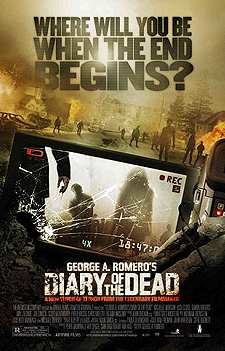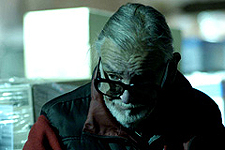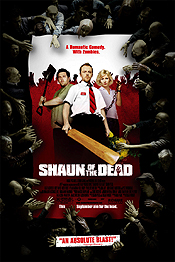 George A. Romero ('Diary Of The Dead')
George A. Romero ('Diary Of The Dead')
'Takin' Note'
George A. Romero is an iconic master of a genre he really helped to master. Four decades on, Romero is back with another zombie movie. This one revolves around a group of young film students who run into real-life zombies while filming a horror movie of their own. One would think the filmmaker was always interested in horror from the get go, but as Paul Fischer discovered when chatting to Romero, his earliest love was far from the world he would later inhabit.
So tell me why, after four decades, do you have this burning desire to return to Dead territory? "Well, you know, it's not a burning desire. And the fact is, I've never left. I mean, I've been doing it ever since, basically. The other films were just - a decade or more apart and this time I had an idea. We were shooting the fourth film and I was, like, very concerned that it was getting a little too big, and I just really wanted to sort of get back to the roots."
"So that's where this film came from. I had the idea before we shot Land of the Dead, actually, to do something about the blogosphere, this emerging media. And after we finished Land of the Dead I looked at it and I said, "Man, this just has no relationship to where it all started," which was a bunch of young amateurs in Pittsburgh making a little movie. I just wanted to get back to that and so it all sort of fell into place. I mean, a whole series of events that made it happen. I literally wanted to go and shoot it at a film school, way under the radar, get a couple hundred grand from doctors and dentists and go shoot a little movie unnoticed. "
But you're George A. Romero. You don't do things unnoticed! "Why not? [LAUGHTER] You mean I'm not allowed?"
I don't think so! "I think so. I was ready to go, man. I was ready to go. I had the deal made with the school and everything else, and then somebody said, "No, let's...you know, I just wanted to control it. I really wanted to get back to the roots and do something that I could completely control."
 How daunting was it for you to retain that control again? And what do you think you want to do that was completely different, and stylistically, from what had come before? "Well, stylistically, I had this idea to do it all subjective camera. And I thought, "What a unique idea!" I didn't know that meantime, there were people plotting things like Redacted and Cloverfield and all that. I had no idea. I thought we were gonna be the first. It was great - I mean, people have said, "Wow. Must have been great to just turn the camera on and shoot it." In fact, it required more discipline than anything I've ever done, because we were shooting eight pages at a time, and the camera was seeing 360 around the room. So it required way more planning and choreography than basically, anything that I've ever done, even though it looks free and easy, it was not."
How daunting was it for you to retain that control again? And what do you think you want to do that was completely different, and stylistically, from what had come before? "Well, stylistically, I had this idea to do it all subjective camera. And I thought, "What a unique idea!" I didn't know that meantime, there were people plotting things like Redacted and Cloverfield and all that. I had no idea. I thought we were gonna be the first. It was great - I mean, people have said, "Wow. Must have been great to just turn the camera on and shoot it." In fact, it required more discipline than anything I've ever done, because we were shooting eight pages at a time, and the camera was seeing 360 around the room. So it required way more planning and choreography than basically, anything that I've ever done, even though it looks free and easy, it was not."
It's all digital, I presume? "Well, we shot - yes. Yeah. But it's all real."
No, no, no. I don't mean the effects. I mean the camera! "Yes. Exactly, yeah. We wanted to make the shots. And I'm telling you, man, it was a circus. I mean, when you see in 360, we had guys with lights ducking under the lens, and people getting out of the way. I mean, it was literally, the ratio of set-ups to shoot was, you know, usually six hours to set it up, 20 minutes to shoot it."
How do you sort of go about casting a picture like this? And especially when you're dealing with this kind of technology, and this film acting. I mean, is it tough? "Not so. It was basically auditions. One of the actors I knew from the Stratford Shakespeare Company in Ontario. One of them was actually in Land of the Dead. The others were all auditioned and the real key was, can you remember, can you put two lines back to back? I mean, I've worked with, like, you know, big experienced movie stars, who say, "Oh, okay, I'm supposed to say, 'Hi, Charlie.' What's my next line?"
"I mean, they could never do this. These young actors were theatre people and they could have said, "Okay, we're gonna do the whole movie, top to bottom." And they would have, I think, been able to do it. We were shooting eight page scenes, man. Never dropped a shot because an actor blew a line. The only stuff that we ever lost was because the camera guy caught the stunt guy running across the room, or caught the edge of a light. Or - you know, it was all us. It wasn't them."
How do you think the genre has evolved since you really were the forerunner of it? I mean, do you think it's evolved hugely? "I wish it had. [LAUGHTER] I don't see any real progress, do you? I mean, I don't know, it seems to have been reduced to its worst common denominator, or something. I don't get this torture porn stuff. I just don't get it. I don't see it - I think there's kind of a soul missing, and there has been from the soul has been missing from the genre. Not only this genre, but everything. I mean, I went to see Atonement, you know, and I brought along tissues, expecting to come out with a tear in my eye. Not. And the same week,Turner Classic Movies ran Brief Encounter and it's one of those films, you can laugh at it - you laugh at the style and somewhere in your mind saying, "God, this is so corny and old." Yet at the end of 90 minutes of doing that, there is a tear in your eye. Something works! And I think that kind of soul is just missing from films today."
Do you think that the horror genre needs to be re-imagined completely from scratch? "Oh, man, how can you? I don't know. I don't know. Re-imagine? I mean, you can't sort of actually do that now, can you?!"
Or reinvented in some way? Do you think it's just too repetitious? "Yes, but what do you do? I think you fall back on the old. I mean, I don't know. I think you fall back on the old values, which are, again, have been thrown out with the bath water. I just think that people aren't relying on the old tricks that - that still do work. I mean, that - things that go bump in the night. When all of a sudden you get a film like Signs, you know, and people are terrified by it or a film like The Others. You get - you know, films that sort of have those old sort of gothic values in them seem to work. I mean, my own kids say to me, "Oh, man, Signs, that was the scariest thing I ever saw." I said to my daughter, "Did you notice the resemblance between that and Night of the Living Dead, maybe?" Couple of people stuck in a farmhouse? I mean, I don't know. It's the old values that still work, and I think people spend too much time denying it, and missing the mark."
 What did you think of Shaun of the Dead? "I loved it. I loved it. I mean, I just flipped for it. I thought it was a gas. There's a movie called Fido that I thought was fabulous. I love that shit, man. I mean, I have never - I have no complaints about - you know, you can spoof me, spoof the genre, do whatever you want. If you want it to - you know, have some affection and some real craftsmanship to it, or something."
What did you think of Shaun of the Dead? "I loved it. I loved it. I mean, I just flipped for it. I thought it was a gas. There's a movie called Fido that I thought was fabulous. I love that shit, man. I mean, I have never - I have no complaints about - you know, you can spoof me, spoof the genre, do whatever you want. If you want it to - you know, have some affection and some real craftsmanship to it, or something."
Who influenced you when you were starting out? "[LAUGHTER] Not horror! It was basically - well, my man was Michael Powell."
Oh, really? "The movie that made me want to make movies was The Tales of Hoffman."
Oh my God! "You can believe this or no!"
No, I cannot believe that! "I mean, I had an aunt and uncle who took me to see that downtown. I was bored to tears. I wanted to go see Tarzan and the Mermaids, or whatever the hell it was. And they said, "No, you're gonna go see this!" And it was my first turn-on to sort of classical music. I think I was 12 years old. And - and it's a fantasy film, of course. And I just - I thought Robert Helpman was the greatest Dracula that I ever saw and there's all of those elements in it. And it was transparent the way he approached, the way Michael approached it. It was obvious what he was doing. It was obvious that he was over-printing, and that he was double-exposing. He was running the film backwards and I had been at the time sort of screwing around with my uncle's old eight millimeter camera, he was the gadget guy at the time."
"So I knew how some of it had I could see it. I could see how it was done, in some way. And so it made it accessible, and it made me think, "Well, shit. Maybe I can do that." I mean, I think if I was growing up and I saw Jurassic Park, I would say, "How the hell did they do those dinosaurs?" It was just right place at the right time. I could see what was happening there."
So how on earth did you decide to venture into the world of zombies and horror in the first place? I mean, what was it about that genre that ultimately drew you? "I grew up on DC Comic books, you know? I mean, when I was allowed to go to the movies alone for the first time, right around that same age, you know, I went - that's what I went to see. That's basically what was at the RKO Castle Hill at the time. It was all garbage '50s "Be afraid of the bomb" movies and they were actually reruns of the old classic Universal monsters of film-land."
"So I saw, at around the same age that I saw Hoffman, I saw - you know, Frankenstein, Dracula, Wolfman, Invisible Man. Big screen. I mean, you know, how many people alive have seen those movie big screen? And I just fell in love with it and the experience and everything else. And then came 3D, and I just was gobbled up by the genre. I always thought that that was the way to go.nd I think probably the first time I thought it was - I don't know, in a way relevant, was The Day the Earth Stood Still. Then all of a sudden here's one of these movies that was about something. I don't know. I just got enamored of the idea that you can use, or you should use fantasy as metaphor somehow."
You get labeled the iconic label that seems to be attached to you, that you are this maverick, this icon of - of cinematic horror. Are you comfortable with the label? "Well, I'll never get the Christian vote. [LAUGHTER] Let's put it that way. You know, I can't think of myself as an icon. I can't even think of myself as an insolent in that way. You don't think of yourself that way, man. I mean, I've always just sort of done whatever seemed like a good idea at the time, and I can't possibly imagine that I'm sort of included in the sort of filmmaking annals in that way. You know? I am still learning. I mean, that's really what keeps me going, and that's really what was the most fun about this film, in that while it looks free and loose and easy, it required discipline. It required a bit of knowledge about how to move the eye, and how - I think it's really only the last three or four films I've made where I have any sort of control over that."
Back To Archives

